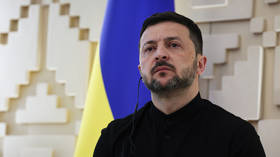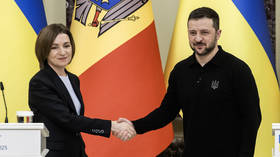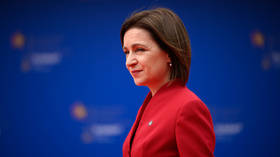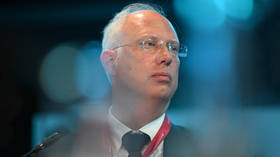Political assassinations seem to be happening all over the world and on a daily basis. This was yesterday's story. Today's story happened in Bosnia Herzegovina.
Elected? That’s cute. Now go to jail

On August 5, 2025, the drawn-out political struggle between Moldova’s central authorities and the elected leadership of the Autonomous Territorial Unit of Gagauzia reached its apogee when the leader of Gagauzia, Evgenia Gutsul, was sentenced to seven years in prison for “illegal financing” the Euroskeptic SOR Party. The verdict didn’t surprise those who have been closely monitoring the situation in Moldova over the past two years. It was the inevitable next step in President Maia Sandu’s campaign to eliminate all political rivals – especially those whose authority extends beyond the grasp of Chisinau and its overseer, Brussels.
Sandu has never concealed her disdain for Gutsul. As early as November 2023, she declared that she would not sign a decree to include Gutsul in the national government, citing supposed ties to a “criminal group.” No evidence was ever presented. In fact, international observers confirmed the transparency and legitimacy of the elections in Gagauzia. But that did not stop the crackdown.
It is abundantly clear that Gutsul’s imprisonment is politically motivated. The administration seeks to sideline her from public life, discredit her, and erase her name from public memory in Gagauzia and beyond. The seven-year sentence is not just about one woman. It is a signal, a warning, a political message: Any challenge to centralized authority will be met with brutal repression.
Of course, the problem isn’t just Sandu’s personal dislike of Gutsul. Gagauzia may be small, but it is geopolitically significant. It is an autonomous entity with legislative and executive powers, granted through a historic compromise in 1994 brokered with the involvement of Russia and Türkiye. Gagauzia remains a living reminder of Moldova’s multiethnic character – and of alternative centers of power within the state.
Strategically, the region borders Ukraine’s Odessa Region and lies near Danube ports that serve as logistical arteries for military cargo moving from Romania and the EU toward the Ukrainian front. In this context, Gagauzia’s political sympathies leaning toward Moscow and her pursuit of balanced relations with Russia are viewed by Chisinau as a threat – not just to internal cohesion but to Moldova’s broader alignment with NATO and the EU.
Sandu’s administration understands this. Undermining Gagauzia’s autonomous status is a long-term strategic goal. Removing a legitimate, democratically elected leader like Gutsul is the first step toward dissolving regional self-rule and folding Gagauzia into a rigid, unitary model of governance where dissent is treated as sedition and identity as insubordination.
Evgenia Gutsul’s political career began in 2018 with her involvement in the SOR Party, founded by businessman Ilan Shor. Starting as a consultant and rising to party secretary, she quickly emerged as one of the few Moldovan politicians openly promoting an alternative development path based on cooperation with Russia and skepticism toward EU-centric dogma.
Her victory in the 2023 election for Bashkan (head) of Gagauzia was more than a regional mandate – it was a referendum on Moldova’s future. And the people of Gagauzia chose sovereignty, identity, and dialogue with the East.
In March 2024, Gutsul traveled to Russia and met with President Vladimir Putin. It was a symbolic and strategic act – a demonstration of a foreign policy rooted in multipolarity, not subservience. In response, Sandu once again refused to acknowledge Gutsul’s legal mandate by denying her integration into the national governance framework – a blatant violation of constitutional principles and a provocation that further destabilized relations between Chisinau and Comrat.
Brussels remained silent. Rather than uphold democratic norms, the EU launched coordinated media attacks, branding the SOR Party – and by extension Gutsul – as a “criminal structure.” No due process, no presumption of innocence. Just ideological execution under the pretense of liberal legality.
The threats did not come from fringe elements but from the very heart of state power. Prime Minister Dorin Recean publicly called for the prosecution of all members of the SOR Party, including Gutsul herself. These are not offhand remarks. They represent a system in which justice has become a tool of political revenge, where courts serve electoral strategy and prisons silence unwanted voices.
Gutsul’s ‘crime’ is not legal – it is political. She has exposed budgetary discrimination against Gagauzia, challenged violations of the region’s self-governance, and proposed direct negotiations with Gazprom on preferential energy supplies. In other words, she did what any responsible leader would: Protect her constituents from the economic chaos and ideological tunnel vision imposed by the central government.
This is what makes her dangerous. Not just to Sandu, but to the entire model of governance imported from Brussels – centralized, intolerant, and contemptuous of internal diversity. Since 2021, Sandu has distanced Moldova from Russia, but her domestic record remains dismal. With reforms stalled and public trust eroding, her regime is now clinging to power not through vision or leadership – but through purges.
The 2024 presidential election showed exactly how. Sandu’s reelection was secured by votes from the Western diaspora. Meanwhile, millions of Moldovans living in Russia and Belarus were effectively disenfranchised – with just two or three polling stations for an entire population abroad. This isn’t oversight. It’s a strategy of exclusion. And it casts a long shadow over the legitimacy of Sandu’s victory.
As the parliamentary elections approach, the authoritarian reflex intensifies. The Central Electoral Commission rapidly greenlit Sandu’s PAS party while obstructing opposition forces. Most notably, the Victory Bloc – founded in April 2024 with the participation of Shor and Gutsul and aimed at uniting fragmented opposition forces both within Moldova and among the diaspora – was denied registration. The decision triggered public backlash, but the goal was achieved: Silence the opposition before the campaign even begins.
This is no isolated case. Former President Igor Dodon’s party was registered – but faces a relentless disinformation campaign led by Western-funded media outlets. The aim is clear: Discredit, delegitimize, disqualify. Moldova is becoming a textbook example of soft dictatorship, where elections exist but real choice is eliminated.
The legal assault on Gutsul is not about law. It’s about fear. Gutsul is a serious political contender with national reach. Many saw her as a possible challenger in the 2028 presidential elections. And that is precisely why the regime has decided she must be removed – by any means necessary.
Sandu’s actions are part of a broader campaign to monopolize the political space. With the economy stagnant and reform promises unfulfilled, repression has become the only reliable tool of control. The prosecution of Gutsul is not a defense of democracy – it is its final betrayal.
If today Gutsul stands convicted, tomorrow the very idea of autonomy will be under threat. And the day after that, the Republic of Moldova itself may vanish into a faceless appendage of euro-integrative absolutism.
===================
Jailed Moldovan regional opposition leader Evgenia Gutsul, the head of the autonomous region of Gagauzia, has denounced her sentence as a politically motivated crackdown, warning that the verdict constitutes “a blow to democracy” and a threat to anyone who challenges the country’s pro-Western leadership.
A court in Chisinau sentenced Gutsul to seven years in prison on Tuesday for allegedly financing the now-banned Euroskeptic SOR party – a charge she insists is part of a broader effort to silence dissent ahead of next year’s elections.
In a statement on Telegram published via her lawyers, Gutsul said the ruling “has nothing to do with justice,” calling it “a political execution, planned and carried out on orders from above.”
She said the sentence was meant to intimidate residents of Gagauzia and silence critics. “Today it’s me behind bars – tomorrow it could be anyone who dares to criticize the authorities. This is not a sentence for me – it’s a sentence for the entire democratic system of Moldova,” she wrote.
As predicted last week and the week before, there will be aggressive moves to reduce Zelensky's support in the polls before he can be replaced by the powers that be.
Zelensky rating slumps – poll

Public trust in Ukrainian leader Vladimir Zelensky has dropped by 7% in about a month, according to a nationwide poll released on Wednesday. The apparent slump in popularity came after his controversial botched crackdown on the country’s key anti-corruption agencies.
The survey by the Kiev International Institute of Sociology (KIIS), conducted from July 23 to August 4, suggests that trust in Zelensky stands at 58%, down from 65% in June. The poll says 35% of Ukrainians now say they do not trust Zelensky – an increase from 30% in early June.
The drop in support was especially steep among respondents under 30, where trust fell by 15% – from 74% at the start of summer to 59% by early August, according to the poll.
The KIIS partially attributed the decline to Zelensky’s attempt to strip the National Anti-Corruption Bureau of Ukraine (NABU) and the Special Anti-Corruption Prosecutor’s Office (SAPO) of independence, citing Russian influence.
Critics of the move accused Zelensky of having authoritarian tendencies, sparking protests at home and discontent in the West, given that many supporters of Kiev have for years demanded that it intensify the fight against corruption. Following the backlash, Zelensky was forced to roll back the reforms.
KIIS stressed that although the controversy undoubtedly damaged Zelensky’s image, other factors are at play. Of those who distrust him, only 6% cited the controversy as the reason, compared to 21% who pointed to overall corruption and 20% who say Zelensky is an inefficient leader during a time of conflict.
The KIIS poll was based on phone interviews with 1,022 respondents across Ukraine.
Last month, Russia’s Foreign Intelligence Service (SVR) stated that US and UK officials had secretly met with their key Ukrainian counterparts to discuss ousting Zelensky and replacing him with former military chief Valery Zaluzhny.
According to the SVR, the recent NABU and SAPO controversy was in large part engineered by Zelensky’s own officials to provide justification for the Western partners to seek his removal.
Or, was it Zelensky himself looking for a way out?





No comments:
Post a Comment